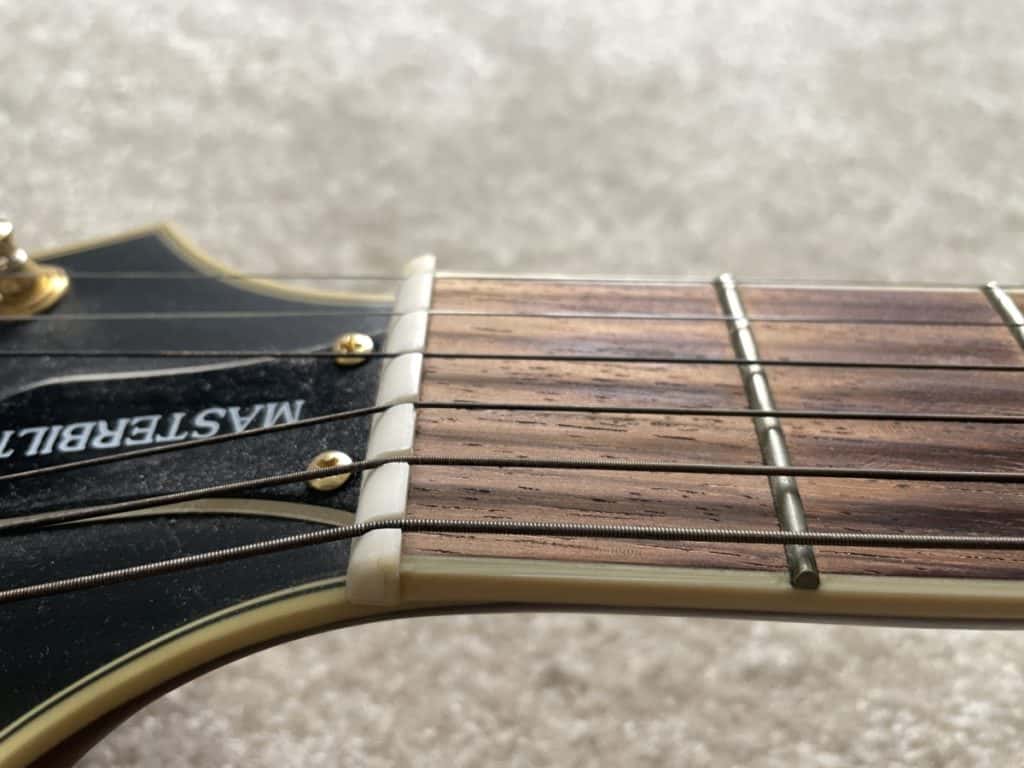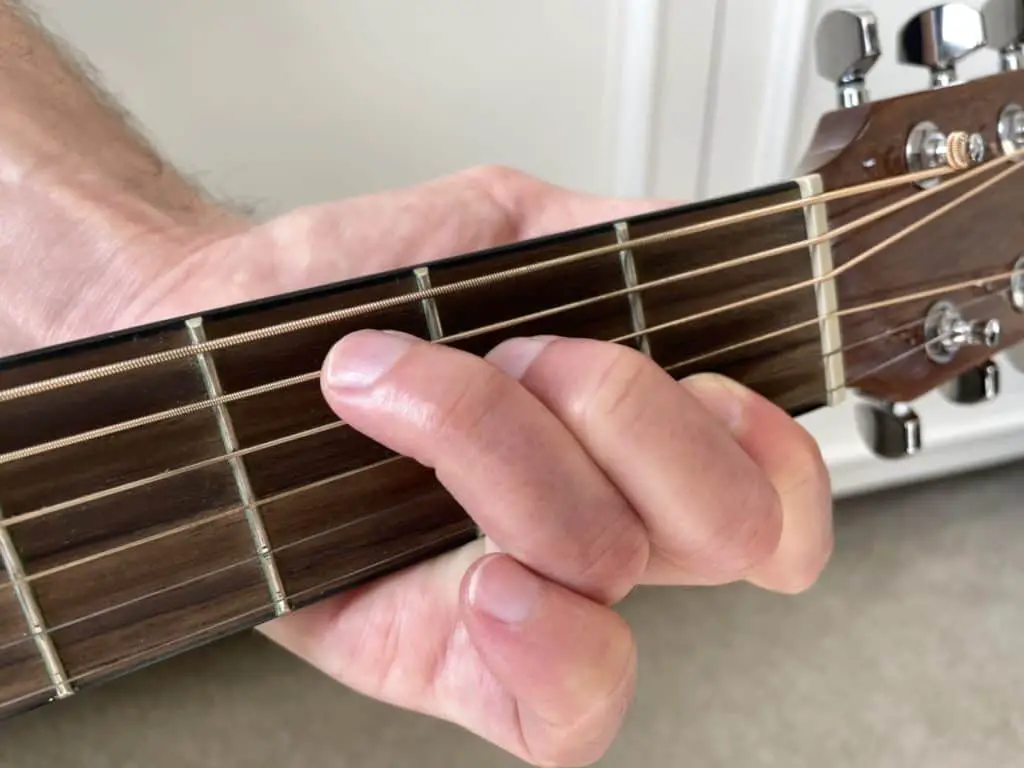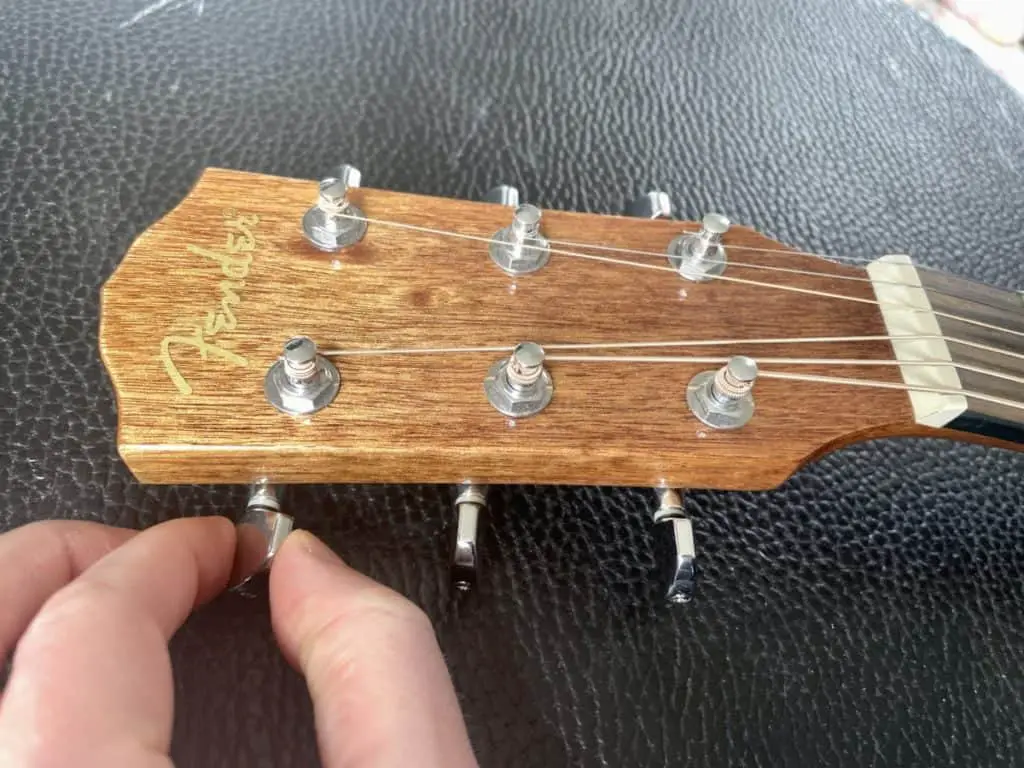Today I’m going to explain whether old guitar strings sound bad.
Over my years as a professional guitarist, I’ve learned the differences between old strings and fresh new ones. The sound that guitar strings produce certainly changes as they are used.
Let’s take a closer look at what happens as strings age, and if aging makes them sound worse.
Do Old Guitar Strings Sound Bad?
Old guitar strings tend to sound duller and less accurate in terms of pitch, and these elements could be described as bad. As strings wear and become dirty, the clarity and precision of their sound begins to suffer. However, dullness can bring warmth, and some players prefer a less than perfect sound.

The preference of old guitar strings versus new is ultimately a personal one. There are guitarists who favor the sound of older strings. There are also guitarists who have their strings changed every day.
If you prefer bright, clear notes with great intonation, I recommend changing your strings regularly.
If you prefer the warmer more “lived in” sound of older strings that is your choice, but you do have to consider intonation and the increased chances of breaking a string.
What Happens to Guitar Strings as They Age?
Every time you press the strings against the frets the strings wear down a bit. This metal on metal contact eventually leaves indents along each string at the points where they meet the frets.

Playing the guitar also leaves some amount of sweat, oil and dirt on the strings. If this does not get wiped off, it remains on the strings causing them to become brittle, dark, and dull sounding.
If a guitar is sitting unplayed, the strings can still become brittle over time, especially if the guitar is not in a case.
Do Old Guitar Strings Cause Fret Buzz?
Old guitar strings should not cause fret buzz. Fret buzz occurs when one or more strings are too close to one or more frets and cannot vibrate as desired. This is caused by other issues such as the action being too low, the neck not being in proper shape, or the nut being too low.
If your guitar has one or more of these issues, changing the strings will not fix the fret buzz. Try to determine where the string is buzzing, and make an adjustment or bring your guitar to a qualified repair person.
Do Old Guitar Strings Lose Intonation?
Old guitar strings tend to play with worse intonation than new strings. This is due to the wear, indentations, and dirt that gets into the strings. Pitch is affected by how the string vibrates at different lengths as you play along the frets, so the condition of the string is important to intonation.
Dirt mainly collects on the strings over the fretboard, where they are touched the most. This dirt effects how the string vibrates and causes issues with intonation.
Good intonation is one of the main reasons I always keep fresh strings on my guitars.
Do Old Guitar Strings Go Out of Tune Faster?
Old guitar strings do not go out of tune faster than new strings. If the strings were fastened properly in the beginning, there is no reason they should necessarily slip out of tune.

In fact, brand new strings tend to go flat until they are “settled in.” Even though this settling period is an inconvenience, the benefits of new strings are worth the effort.
If a string repeatedly goes out of tune, give the string a tug and see if the string is beginning to unwind. Change your strings and be sure to use correct technique when fastening the new ones. How you fasten your strings is relevant to how well they will stay in tune.
Do Old Guitar Strings Lose Tension?
Old guitar strings do not lose tension. The real concern is that old strings are more likely to break or unwind due to their condition. The only way a string would lose tension is if it slips a bit from where it is fastened to the tuning peg.
This is more likely attributable to changing the strings incorrectly or having low quality tuning pegs.
Do Old Guitar Strings Get Stiff?
Old guitar strings can get a bit stiff especially if the guitar has gone unplayed for an extended amount of time. Even if a guitar is played regularly, the dirt and dust that builds up on the strings tends to add a bit of stiffness to the strings.
To keep your strings fresh, be sure to wipe them down after playing and keep your guitar in a case when it is not being played.
Are Old Guitar Strings Harder to Play?
Old strings may be a bit harder to play due to stiffness. Playing certain chord shapes may be more difficult with stiff strings especially on an acoustic guitar which has higher string tension to begin with.
If you are not able to depress the strings sufficiently, the note, dyad, or chord you are attempting will not ring fully. This will result in a muffled or muted sound.
Most importantly, newer strings produce a clearer, more in-tune sound when compared with older strings.
For the most ease in playing, change your strings regularly and use a thinner gauge such as 0.10 or lower.
How Often You Should Change Guitar Strings
Now, this probably raises the question, of how old is actually “old” when it comes to guitar strings?
Well, it depends on a few factors, but here’s how often you should generally change strings:
If you play daily, start by changing your strings every 2 months. If you play less often, then reduce the frequency. For example, if you only play 3 days a week, you could try replacing your strings every 4-5 months. Every guitarist is different, so experiment to find a string changing routine that works for you.
And it’s worth mentioning, that you should always try to change your strings BEFORE they are expected to break, or as soon as you notice your sound beginning to suffer.
So, if your strings are becoming noticeably worn or you notice a dullness in the sound, start changing them earlier. On the other hand, if your strings are still in good shape when you had planned to change them, keep them on a bit longer.